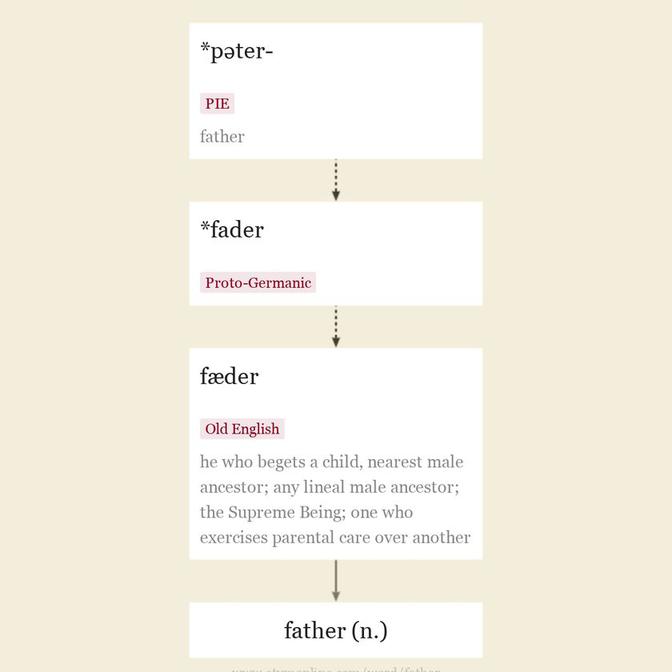hither (adv.)
Old English hider, from Proto-Germanic *hithra- (source also of Old Norse heðra "here," Gothic hidre "hither"), from PIE *kitro-, suffixed variant form of root *ko-, the stem of demonstrative pronoun meaning "this" (compare here). Spelling change from -d- to -th- is the same evolution seen in father, etc. Relation to here is the same as that of thither to there.
Entries linking to hither
Middle English fader, from Old English fæder "he who begets a child, nearest male ancestor;" also "any lineal male ancestor; the Supreme Being," and by late Old English, "one who exercises parental care over another," from Proto-Germanic *fader (source also of Old Saxon fadar, Old Frisian feder, Dutch vader, Old Norse faðir, Old High German fatar, German vater; in Gothic usually expressed by atta).
This is from the PIE root *pəter- "father" (source also of Sanskrit pitar-, Greek pater, Latin pater, Old Persian pita, Old Irish athir "father"), which is presumably from baby-speak sound "pa." The ending formerly was regarded as an agent-noun affix. The classic example of Grimm's Law, where PIE "p-" becomes Germanic "f-."
The spelling with -th- (15c.) reflects a widespread phonetic shift in Middle English that turned -der to -ther in many words, perhaps reinforced in this case by Old Norse forms; the spelling caught up to pronunciation in 1500s (compare mother (n.), weather (n.), hither, gather).
As a title of various Church dignitaries from c. 1300; the meaning "creator, inventor, author" is from mid-14c.; that of "anything that gives rise to something else" is from late 14c. As a respectful title for an older man, recorded from 1550s. Father-figure is from 1954. Fathers "leading men, elders" is from 1580s.
My heart leaps up when I behold
A rainbow in the sky:
So was it when my life began;
So is it now I am a man;
So be it when I shall grow old,
Or let me die!
The Child is father of the Man;
I could wish my days to be
Bound each to each by natural piety.
[Wordsworth, 1802]
Old English her "in this place, where one puts himself; at this time, toward this place," from Proto-Germanic pronominal stem *hi- (from PIE *ki- "this;" see he) + adverbial suffix -r. Cognate with Old Saxon her, Old Norse, Gothic her, Swedish här, Middle Dutch, Dutch hier, Old High German hiar, German hier.
As the answer to a call, in Old English. Right here "on the spot" is from c. 1200. Here and there "in various places" is from c. 1300. Exact phrase here today and gone tomorrow is by 1680s in writings of Aphra Behn (here to-day, a-wey to-morn is from late 14c.). Here's to _____ as a toast is from 1590s, probably short for here's health to _____. Emphatic this here (adv.) is attested from mid-15c.; colloquially, this here as an adjective is attested from 1762. To be neither here nor there "of no consequence" is attested from 1580s. Here we go again as a sort of verbal rolling of the eyes is attested from 1950.
As a noun, "this place, the present" from c. 1600. Noun phrase here-and-now "this present life" is from 1829.
Trends of hither
More to Explore
updated on December 16, 2017
Trending words
Dictionary entries near hither
hit-and-run
hitch
hitcher
hitchhike
hithe
hither
hitherto
Hitler
hitman
hit-or-miss
Hittite

